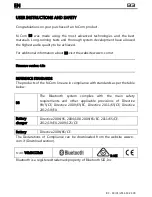
Active Parking Assist may also display spaces
not suitable for parking, e.g.:
R
parking or stopping prohibitions
R
in front of driveways or entrances and exits
R
unsuitable surfaces
Parking tips:
R
on narrow roads, drive as closely as possi-
ble past the parking space
R
parking spaces that are littered or over-
grown might be identified or measured
incorrectly
R
parking spaces that are partially occupied
by trailer drawbars might not be identified
as such or be measured incorrectly
R
snowfall or heavy rain may lead to a parking
space being measured inaccurately
R
pay attention to the PARKTRONIC
(
Y
page 210) warning messages during the
parking procedure
R
you can intervene in the steering procedure
to correct it at any time. Active Parking
Assist will then be cancelled
R
when transporting a load which protrudes
from your vehicle, you should not use
Active Parking Assist
R
never use Active Parking Assist when snow
chains are fitted
R
make sure that the tyre pressures are
always correct. This has a direct influence
on the parking characteristics of the vehi-
cle.
Use Active Parking Assist for parking spaces
that are:
R
parallel or at right angles to the direction of
travel.
R
on straight roads, not bends
R
on the same level as the road, e.g. not on
the pavement
For vehicles with the trailer tow hitch folded
out, the minimum length for parking spaces is
slightly longer.
If you have attached a trailer to your vehicle,
you should not use Active Parking Assist.
Once the electrical connection is established
between your vehicle and the trailer, Active
Parking Assist is no longer available.
PARKTRONIC is deactivated for the rear area.
Detecting parking spaces
Objects located above the height range of
Active Parking Assist will not be detected
when the parking space is measured. These
are not taken into account when the parking
procedure is calculated, e.g. overhanging
loads, tail sections or loading ramps of goods
vehicles.
G
WARNING
If there are objects above the detection range:
R
Active Park Assist may steer too early
R
the vehicle may not stop in front of these
objects
This could cause a collision. There is a risk of
an accident.
If objects are located above the detection
range, stop and deactivate Active Parking
Assist.
For further information on the detection
range (
Y
page 209).
Active Parking Assist does not assist you
parking in spaces at right angles to the direc-
tion of travel if:
R
two parking spaces are located directly
next to one another
R
the parking space is directly next to a low
obstacle such as a low kerb
R
you forward park
Active Parking Assist does not assist you
parking in spaces that are parallel or at right
angles to the direction of travel if:
R
the parking space is on a kerb
R
the system reads the parking space as
being blocked, for example by foliage or
grass paving blocks
R
the area is too small for the vehicle to
manoeuvre into
R
the parking space is bordered by an obsta-
cle, e.g. a tree, a post or a trailer
Driving systems
213
Driv
ing
and
pa
rk
ing
Z
















































